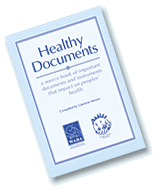 World Alliance for Breastfeeding Action |
|
| Introduction | ||||||
|
|
| This document: |
|
printable
version
|
|
|
The year 2000 is now behind us. And as we look back, what do we see? The path
traversed since Alma Ata is littered with several more international meetings on health
and declarations and resolutions (which have even been ratified by governments); but
the target of Health for All is far from being achieved. Not much seems to have changed
for the people, especially for the poor people in the developing countries. The situation
is getting worse with many countries channeling more funds into their defence budgets
at the cost of other priorities, such as, health and social welfare. An increasing number
of countries are meanwhile privatising their health services, pushing these services beyond
the reach of the common people.
Is a vision of "Health for All" still possible? ask Zafrulla Chowdhary and Mike Rowson in
their article, "Alma Ata 1978: Reviewing Another Broken Promise (PHA Daily Alert, 5
Dec. 2000). They believe it is possible through the people's Health Assembly
(PHA) held at Savar in Bangladesh on 3-8 December 2000 in which nearly 2000 people from
over 80 countries participated. The authors believed that "the PHA aimed to act as a
force for change" and to kick off a grassroots advocacy movement which can defend
people's right to health and make sure the Alma Ata vision became a reality".
As the people's Health Assembly looked at new strategies to remedy the situation, we
found it useful to examine some of the international declarations and resolutions on
health, and also the supporting instruments of the United Nations ratified by various
governments. We also need to keep them in sight when working out our plan of action.
At the end of this exercise, the question we are looking at critically is: "What is beyond
this resolution? How do we reach healthcare to people at the grassroots? And what have
we learnt from our earlier experiences?"
We therefore presented a draft compilation, Healthy Documents: a sourcebook of important
documents and instruments that impact on peoples' health, at the international people's
Health Assembly at Savar, and sought the views of some key participants - health
activists, health professionals and practitioners, teachers, policy makers, UN officials
and also officials from the government health departments and ministries. Their response
has been overwhelming and we have tried to incorporate appropriate suggestions
and comments before finalising this publication.
The finalised Healthy Documents contains resolutions, declarations and charters on health
made at international meetings and also related UN instruments, such as international
covenants, programmes and platforms of action which support these declarations.
The declarations and UN instruments are arranged in seven categories: 1) Medical Ethics,
2) Health Rights, 3) Public health, 4) Health and Social Development, 5) Nutrition,
6) Children's Health, and 7) Women's Health.
We also thought it relevant and inspiring to showcase in Section II, the success stories of
campaign by two international organisations, the International Baby Food Action Network
(IBFAN) and the World Alliance for Breastfeeding Action's (WABA) both based in
Penang, Malaysia. IBFAN's advocacy work centred around implementing a UN instrument,
the WHO International Code of Marketing of Breastmilk Substitutes (1981), and
WABA's efforts aimed at realising the Innocenti Declaration on Protection, Promotion
and Support of Breastfeeding adopted in 1991. Both these organisations have worked
relentlessly in pursuit of their goals and it would be useful to share their strategies so
that other organisations could adapt and apply them in their own work of ensuring the
implementing of international declarations and UN instruments.
The Healthy Documents also includes three Appendices containing websites which are
the sources of the documents and contacts of organisations and individuals active in
health issues, especially those who participated in the PHA. It also includes information
about the World Health Organization, its objective and Mission Statement, and the role
and responsibilities of the World Health Assembly.
We hope that the international declarations, especially the people's Health Charter,
drafted after much deliberation and adopted at the Savar people's Health Assembly,
are upheld. The people's Health Charter, in particular, needs special attention. As stated
in PHA Daily Alert, 5 Dec. 2000, the Charter sets out the people's vision of hope for the
future, their guiding principles, their commitments and demands, representing networks,
organisations and individuals who are ready to challenge powerful interests – who
want to place health as a top priority in policy-making, and who believe social and
economic policies have to be redirected.
Lakshmi Menon
Mumbai, India
June 2001
|


 Healthy Documents
Healthy Documents